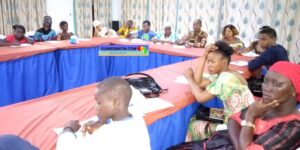
Kindia: key stakeholders discuss national reconciliation

The curtains fell on Saturday, 28 December 2019, on a debate focused on the situation of national reconciliation in Guinea, in the prefecture of Kindia. For 2 days, young students, students, teachers, members of political parties and civil society, as well as religious leaders have strengthened their capacity in the reconciliation approach and the non-violence strategy, reports one of the Guineematin.com correspondents based in the prefecture.
This is a project initiated by the National Coalition in Support of National Reconciliation (CONAREG) and its local partners, namely OGDH, AVIPA and COJEDEV.
But why the film and the body maps? The Lower Guinea Regional coordinator of the violence prevention and community consultation project explains: « it is in the context of the promotion of transitional justice and national reconciliation that is initiated in Guinea. So, we are here to work with young people and religious leaders to set up a local network that will be affiliated with CONAREG and that will be able to support all the efforts we have already been made to achieve true national reconciliation in our country. We therefore took advantage of this opportunity to project this film, to examine the body maps, because almost all of the young people are in complete ignorance of our history. Especially in terms of human rights violations. So, it is to make a summary of the old painful memories recorded in our country so that this generation can immerse itself in the realities of our country to be peace messengers » specified Mr. Bah Sidi Mohamed.
Jean Zézé Guilavogui, Project Manager of the Consortium of Young Associations for the Defence of Victims of Violence, returned to the culture of non-violence and national reconciliation. « We are in Kindia as part of the activities of the project entitled Violence Prevention through community consultations. To do this, we must necessarily work with communities to allow them to be a player in non-violence and promote national reconciliation because today we are really blocked. So we need advocacy that could unblock the situation », explains Jean Zézé Guilavogui.
For him, reconciliation is quite possible in Guinea. In his opinion, the particular situation of Guinea is between the governments that follow each other and the population. « Like other countries that have also experienced more atrocities than ours, I think that it is possible, because the particular situation of Guinea is between Guineans, in other words the Guinean governments that followed and the populations. I think it’s as simple as that. Because the mechanisms of transitional justice adapt to the realities that cross the country »
During this meeting, the participants were impacted not only by the stories traced in the body maps, some sons of the country saw their dream break on the way, but also by the projection of a 1-hour 07-minute film entitled « the long path to reconciliation ». A film that shows the face of Guinea in the regimes that it has known and especially that also showed vandalism, rape and killing, at the events in our country.
The participants at this meeting did not hide their satisfaction with the content of the exchanges. Kourouma Michel, study director at the Sambaya college: « I leave this training as if I was a direct victim, putting myself in their place. So it makes me aware of how to prepare the memory of future generations so that such violence is not repeated in our country ».
Fatou Damé, a student in Terminal Class, at the Groupe Scolaire Privé la Francophonie: « I learned a lot through this documentary. First of all, an awakening of consciousness; then, I knew that most victims of violence suffered, but they did not give up. Others, however, started in human rights defenses to say that the rising generation can do better by forgetting everything that happened yesterday, close your eyes so that Guinea can move forward and close your eyes to say that my Guinea no longer knows this violence without justice, for a better day ».
According to Elhadj Oumar Camara, Iman de la Gare, this meeting has just come to the point: « I am very delighted with this debate between the sons of my country during this somewhat tense period. We need to know that Guinea does not belong to an individual. So, do everything possible to prevent her from burning. Pardon us for the mistakes and violence of the past, for the social peace and development of our dear country ».
For Diallo Aminata, teacher at Tafori College, reconciliation would be possible if Guinean justice did its job well: « I think reconciliation would be possible here, if the State tells the truth to the victims so that they stop crying. When we also want to talk about reconciliation, there must also be justice. If, however, justice is not given, and victims always feel injured, it is not easy to talk about reconciliation », emphasized Diallo Aminata.